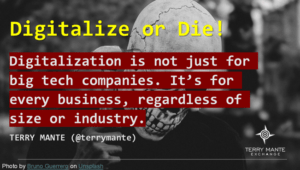By Terry Mante
Many years ago, I had an encounter with a newspaper editor in Ghana’s capital city of Accra. I advised him to consider launching a corresponding website for his newspaper, recognizing the growing shift towards digital news consumption.

His response was simple but striking: “We are a newspaper, so if we put our news online, people will not buy the paper.” He was firm in his belief that by offering free access to news online, it would cannibalize the newspaper’s print sales. Less than two years down the line, the paper was out of circulation—extinguished by the very change it feared.
This encounter exemplifies a lesson that many businesses are grappling with in the digital age: Digitalize or Die. The Fourth Industrial Revolution has introduced rapid technological advancements that are reshaping industries at an unprecedented pace.
From media to retail, banking to education, every sector is being forced to adapt to the new digital reality or risk becoming irrelevant. The editor’s resistance to digital transformation cost his business its survival.
In a world where consumers are increasingly demanding convenience, immediacy, and accessibility, clinging to traditional methods can lead to obsolescence.
The digital imperative
Today’s businesses operate in a connected, data-driven ecosystem. The Internet has revolutionized how we access, share, and consume information. It has changed how businesses operate and how consumers engage with products and services. Digital platforms, automation, and data analytics are disrupting traditional industries like media, retail, finance, and even education.
Social media, search engines, and mobile applications have become central to how people interact with brands and services. As consumer behavior shifts towards greater convenience, immediacy, and personalization, businesses that fail to keep up with these changes are likely to become obsolete.
For media houses, for instance, the advent of digital platforms has expanded their reach far beyond local circulation. News no longer has geographical boundaries. A story published online can be read in real time by someone halfway around the world. This is a golden opportunity, not a threat.
In the case of print media, the rise of digital news platforms has made newspapers and magazines increasingly less relevant to the modern reader. People no longer need to wait for the morning paper to get the latest news—they can access it with the tap of a screen.
Moreover, online news offers interactive and multimedia content that enhances user experience in ways that print media cannot. This is not necessarily a threat.
The key lies in adopting a digital mindset—understanding that print and digital can coexist and even complement each other. In fact, by developing a robust online presence, traditional newspapers can diversify their revenue streams through digital ads, subscriptions, and multimedia content.
For businesses, this digital shift presents both challenges and opportunities. On the one hand, the need to invest in new technology, update business models, and train employees can seem daunting.
On the other hand, digital transformation offers unparalleled opportunities to reach a global audience, scale operations, and develop new revenue streams. As more consumers move online, businesses that embrace digital tools can position themselves at the forefront of their industries.
Resistance to change
Why do some businesses, like the newspaper I encountered, resist digitalization? The reasons are varied — fear of the unknown, reluctance to invest in new technology, or perhaps a belief that their current business model will always work.
This mindset is dangerous because the pace of change is relentless. Digitalization is not just a trend; it’s a fundamental shift in how the world operates.
In the case of the Accra-based newspaper, the reluctance to embrace online platforms stemmed from the belief that online content would detract from print sales.
Yet, what the editor failed to see was the larger picture: consumer behavior was already shifting toward online news consumption. By not having a website, the paper alienated a growing audience and eventually became irrelevant.
Digital transformation as a business strategy
To thrive in today’s world, businesses must view digital transformation as a strategic imperative. This is not just about creating a website or setting up social media accounts.
It involves rethinking business models, leveraging data analytics, adopting automation, and integrating digital tools into every aspect of operations. It’s about delivering value to customers in the most convenient, efficient way possible.
Consider the rise of e-commerce. Retailers who once relied solely on brick-and-mortar stores are now embracing digital platforms to reach a broader customer base.
Even small local businesses have found ways to expand their reach through online sales, social media marketing, and digital payment systems. The pandemic accelerated this shift, highlighting the importance of agility and adaptability in a changing world.
Embrace the future
Digitalization is not just for big tech companies. It’s for every business, regardless of size or industry. It offers opportunities for innovation, scalability, and enhanced customer engagement.
It allows businesses to gather insights, make data-driven decisions, and stay competitive in a fast-evolving marketplace.
The lesson from my experience with the newspaper editor is clear: the refusal to adapt to the digital age can lead to irrelevance. The world is moving forward, and those who fail to keep pace will be left behind.
——Bottom of Form
About the author
Terry Mante is a thought leader whose expression as an author, corporate trainer, management consultant, and speaker provides challenge and inspiration to add value to organizations and position individuals to function effectively. He is the Principal Consultant, Terry Mante Exchange (TMX). Connect with him on LinkedIn, Facebook, X, Instagram, Threads and TikTok @terrymante and www.terrymante.org.










